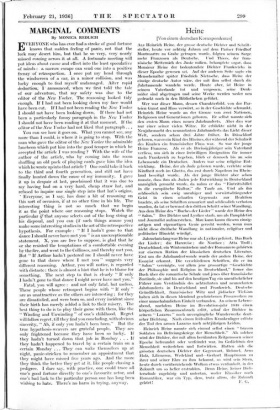MARGINAL COMMENTS -
By MONICA REDLICH
EVERYONE who has ever had a stroke of good fortune knows that sudden feeling of panic, not that the luck may desert him, but that he so very, very nearly missed coming across it at all. A fortunate meeting will put ideas about cause and effect into the least speculative of minds a narrow escape can send one into a positive frenzy. of retrospection. . I once put my head through the windscreen of a car, in a minor collision, and was lucky enough to find myself undamaged. After rapid deduetion-,- I ' annotmeed,- -*hen we - first told- the tale of our adventure, that my safety was due to the editor of the New Yorker. The reasoning looked tidy enough. If I had not been looking down my face would have been cut. If I had not been reading the New Yorker I should not have been looking down. If there had not been a particularly funny paragraph in the New Yorker I should not have been reading it at that moment. If the editor of the New Yorker had not liked that paragraph .. .
You can see how it goes on. What you cannot see, any more than I could, is where it is going to stop. With the man who gave the editor of the New Yorker the admirable luncheon which put him into the good temper in which he accepted the article r was reading ? With the wife of the author ,of the article, who by coming into the room shuffling an old pack of playing cards gave him the idea which he wrote up into that article ? One could take it back to the third and fourth generation, and still not have finally hunted down the cause of my immunity. I gave it up in despair at last, proclaimed that it was due to my having had on a very hard, cheap straw hat, and refused to inquire one single step into that hat's origins. —EVerybne:, as I say, has done a bit of reasoning on this sort of occasion, if at no other time in his life. The interesting thing is not so much that we begin it as the point where our reasoning stops. Watch the particular if that anyone selects out of the long string at his disposal, and you can (if such things amuse you) make some interesting studies in the art of the retrospective hypothesis. For example : " If I hadn't gone to that dance I should never have met you " is an unexceptionable statement. X, you are free to suppose, is glad that he or she resisted the temptations of a comfortable evening by the fire, and went to the Collinses, and thereby met you. But If Arthur hadn't pestered me I should never have gone to that dance where I met you " suggests very different reasoning. Arthur, you will notice, is regarded with distaste : there is almost a hint that he is to blame for something. The next step to that is clearly " If only I hadn't gone to that dance I might never have met you."
Fatal, you will agree : and not only fatal, but useless. These people whose retrospect begins with " If only " are as unattractive as the others are interesting ; for they are dissatisfied, and were born so, and every incident since their birth has merely added a link to their misery. The best thing to do is to play their game with them, like the " Winding and Unwinding " of one's childhood. Regret will follow regret, till they find you concluding, with obvious sincerity, " Ah, if only you hadn't been born." But the true hypothesis-weavers are grateful people. They are only frightened because they have been so lucky. If they hadn't turned down that job in Bombay . . . If they- hadn't happened to travel by a certain train on a certain Monday . . . They can wake themselves up at night, panic-stricken to remember an appointment that they might have missed five years ago. And the more they think the better they get at it, like people chasing a pedigree. I dare say, with practice, one could trace all one's good fortune directly .to one's favourite actor, and one's bad luck to the particular person one has long been wishing to hate. There's no harm in trying, anyway.














































 Previous page
Previous page